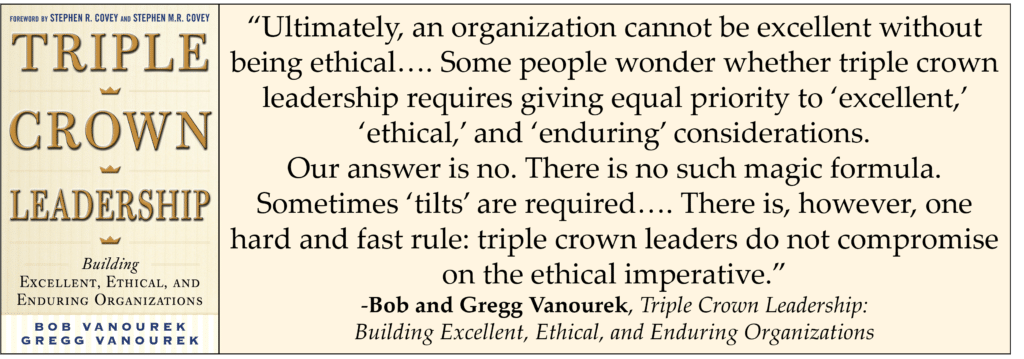These days, we find ourselves with a dearth of courageous leaders. Too often, we have cowardly leaders who duck, dodge, and go along instead of leading from the front.
This comes with painful consequences, from low trust in organizations and institutions to low respect and engagement in the workplace. We can—and must—do better.
We need more courage. Think of the inspiring courage of Alexei Navalny.

Consider Volodymyr Zelenskyy.

Think of Malala.

Consider the young women who testified to Congress about the wrongdoing they witnessed, despite grave personal and professional risks. And think of the poll workers who continue to do their job despite the disruptions and even threats.
It begs the question:
What are we doing in our own context?
What’s our standard for the kind of leader we’re willing to tolerate—
and the standard we want to set for our organizations, our children, and the next generation?
We can think about this in three ways: general actions of courageous leaders, actions of moral courage, and actions to foster courage in our organizations. We address each in turn below.
1. General Actions of Courageous Leaders
Here are the telltale actions of courageous leaders:
- setting boundaries and saying no sometimes even when it may disappoint or anger others
- making decisions and moving forward despite limited information
- being willing to be wrong sometimes
- hiring and supporting strong-willed, smart, experienced people who will challenge us and our colleagues
- stepping into challenging situations where there’s conflict, instead of avoiding them
- demanding action from ourselves and our colleagues, teams, and organizations
- holding people accountable for core commitments
- refusing to go along with a culture of overwork that includes staying late to impress the boss instead of just getting the job done and going home
- shaking things up to move forward instead of playing it safe
- taking risks and being willing to fail fast and learn
2. Actions of Moral Courage
Here are actions we can take to defend the ethical imperative and demonstrate moral courage:
- stopping ourselves when we’re about to do something wrong
- challenging others when they’re on the brink of doing something wrong
- defending colleagues who are being mistreated
- challenging injustices
- putting the interests of the whole or of a higher purpose above our own
- telling an abusive customer who has insulted a worker that they can’t speak that way to our colleague (and terminating the relationship if they continue)
- telling peers the joke they just told is inappropriate or offensive
- questioning an action senior management is considering that strikes us as inconsistent with the organization’s shared values
- refusing to engage in an unethical act that our boss has instructed us to do—and explaining why
- becoming a whistleblower (after exhausting all internal avenues) to stop a significant unethical practice


Personal Values Exercise
Complete this exercise to identify your personal values. It will help you develop self-awareness, including clarity about what’s most important to you in life and work, and serve as a safe harbor for you to return to when things are tough.
3. Actions to Foster Courage in Our Organizations
Here are actions we can take to create the conditions in which others can be brave in our organizations:
- demonstrating vulnerability
- walking the talk in defending the organization’s shared values
- creating and protecting psychological safety in the organization
- encouraging people to challenge us (and others) and speak up when they have concerns
- following up on those concerns
- recognizing and celebrating people for doing the right thing
- building ethics and values into our hiring and training processes and compensation and recognition systems
- measuring our ethical behavior
- rewarding people for taking risks responsibly
We need more courageous leaders and followers committed to doing what’s right, even when it’s hard.
Reflection Questions
- How are you doing on these fronts?
- How are the leaders you work with doing?
- What needs to change?
- What will you do about it, starting now?

Alignment Scorecard
When organizations aren’t aligned, it can reduce performance dramatically and cause frustration and dysfunction. With this Alignment Scorecard, you can assess your organization’s level of alignment and make plans for improving it.
Tools for You
- Leadership Derailers Assessment to help you identify what’s inhibiting your leadership effectiveness
- Personal Values Exercise to help you determine and clarify what’s most important to you
- Alignment Scorecard to help you assess your organization’s level of alignment

Leadership Derailers Assessment
Take this assessment to identify what’s inhibiting your leadership effectiveness. It will help you develop self-awareness and identify ways to improve your leadership.
Related Articles
- “Courage and Leadership”
- “Getting Good at Overcoming Fear”
- “Are You Strong Enough to Be a Voice of One?”
- “The Ethical Challenges Faced by Leaders”
- “The Importance of Integrity in Leadership”
- “Why Conflict Is Good—And How to Manage It”
- “What Are You Avoiding?”
Postscript: Quotations
- “You’ll never do anything in this world without courage. It’s the greatest quality of the mind next to honor.” -Aristotle, ancient Greek philosopher
- “Life is demanding. Luckily, there is one quality that drives transformational leadership and personal and institutional success. That one quality is courage…. Courage is the single most decisive trait in a leader.” – Gus and Diane Elliott-Lee, Courage: The Backbone of Leadership
- “The great need for anyone in authority is courage.” -Alistair Cooke, British-American writer
- “…courage is the enforcing virtue, the one that makes possible all the other virtues common to exceptional leaders: honesty, integrity, confidence, compassion, and humility. In short, leaders who lack courage aren’t leaders.” -John McCain, former U.S. Senator and Navy veteran
- “You gain strength, courage, and confidence by every experience in which you really stop to look fear in the face. You must do the thing which you think you cannot do.” -Eleanor Roosevelt, former First Lady, diplomat, and activist
- “Without courage, all other virtues lose their meaning.” -Winston Churchill, British statesman, soldier, and writer and former wartime Prime Minister
- “This, then, is the deeper territory of leadership, collectively listening to what is wanting to emerge in the world, and then having the courage to do what is required.” -Joseph Jaworski, author and business leader
- “To sin by silence when they should protest makes cowards out of men.” -Abraham Lincoln, lawyer, statesman, and former U.S. president
- “Courage faces fear and thereby masters it. Cowardice represses fear and is thereby mastered by it.” -Martin Luther King, Jr., minister, activist, and civil-rights leader
- “Conflict aversion is the organizational bubonic plague of our times.” -Gus Lee with Diane Elliott-Lee, Courage: The Backbone of Leadership
- “What would you do if you weren’t afraid?” -Sheryl Sandberg, technology executive, philanthropist, and writer
- “When we practice the behaviors of courage, we become courageous.” -Gus Lee with Diane Elliott-Lee, Courage: The Backbone of Leadership
- “An ounce of action can crush a ton of fear.” -Tim Fargo, author
- “It’s easy to stand with the crowd. It takes courage to stand alone.” -Mahatma Gandhi, Indian lawyer and transformational leader
- “Feel the fear and do it anyway.” -Susan Jeffers, psychologist and author
- “Courage was the X factor in change. Courage is the virtue that’s needed if we’re truly going to transform our lives. Courage is the virtue that’s needed if we’re going to enact anything that is significantly important to us. Courage is the virtue that’s needed if we’re going to change the status quo.” -James Kouzes and Barry Posner, A Leader’s Legacy
- “Courage is the lever of leadership, while cowardice invites its collapse.” -Gus and Diane Elliott-Lee, Courage: The Backbone of Leadership

Triple Crown Leadership Newsletter
Join our community. Sign up now and get our monthly inspirations (new articles, announcements, opportunities, resources, and more). Welcome!
+++++++++++++++++++++++
Gregg Vanourek is a writer, teacher, and TEDx speaker on personal development and leadership. He is co-author of three books, including Triple Crown Leadership: Building Excellent, Ethical, and Enduring Organizations (a winner of the International Book Awards written with his father, Bob Vanourek). Check out their Leadership Derailers Assessment or get their monthly newsletter. If you found value in this, please forward it to a friend. Every little bit helps!

